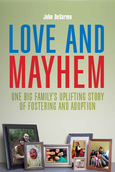Being a foster parent is a difficult task; perhaps one of the hardest things you will ever do. The hours are long, the emotional toils are burdensome, the housework never ends, and the point of complete exhaustion seems to always be around the next corner. Strong foster fathers appreciate this, and recognize that if his family is to remain intact, healthy, and strong, he must take steps to see that his own wife/partner has not reached that stage of exhaustion. Indeed, a foster dad is one who places his marriage as a priority. If not, the family will no longer be able to function as a foster family. For me, the partnership with my wife is essential in so many ways, and I would not be a good foster parent if not for her.
Join the thousands who receive Dr. DeGarmo's FREE foster care newsletter. Simply fill out the form below.
Although it may be difficult to schedule, foster dads need to try and have a Date Night with their spouse on a regular basis. I understand that this can be quite difficult, and I struggle to do this, as well. Yet, whether this is once every two weeks once a month, or a similar example, spouses need to have time alone to re-charge their foster batteries, have time to talk without the constant interruption of children, and simply to re-connect with each other and listen to the wishes and frustrations each has. If the partnership is to remain healthy, and the foster family a stable one, foster dads need to communicate daily with their spouse, if only for five minutes a day. Anniversaries, birthdays, and other important dates should not be forgotten by the foster father, as this usually leads to some heavy apologizing afterwards. Indeed, foster dads should make a commitment to their marriage and make time for it each day in some way. Express appreciation for all the work your partner does. Maintain a positive sense of humor. Learn the fine art of compromise; practice forgiveness and learn to fight fair. These are all practices a healthy foster father should employ. Remember, there should be no shame in seeing a marriage counselor with your spouse. Sometimes, a listening ear and a helpful word can aid in creating a healthier marriage. There may be times when your spouse simply needs a break from the demands of being a foster parent. A strong and wise foster father is one who allows the foster to spend some time by herself, or with her friends. Shopping, a trip to the movie theatre, out to dinner with friends, or just some personal time by herself are necessary for her own well being.
To be sure, your role as a foster father is an important one, and one that should not be taken lightly. We are all an example for not just this child in need, but for his biological family members, our friends and colleagues, members of our community that we live in, and those in our own household. As noted before, you may be the first and only positive male role model the child has ever had, and maybe the only one in his lifetime. As foster dads, we need to step up and embrace this responsibility and not leave it to our wives and partners.
-Dr. John DeGarmo
For more information on foster parenting, buy Dr. DeGarmo’s The Foster Parenting Manual: A Practical Guide to Creating a Loving, Safe, and Stable Home.



 RSS Feed
RSS Feed